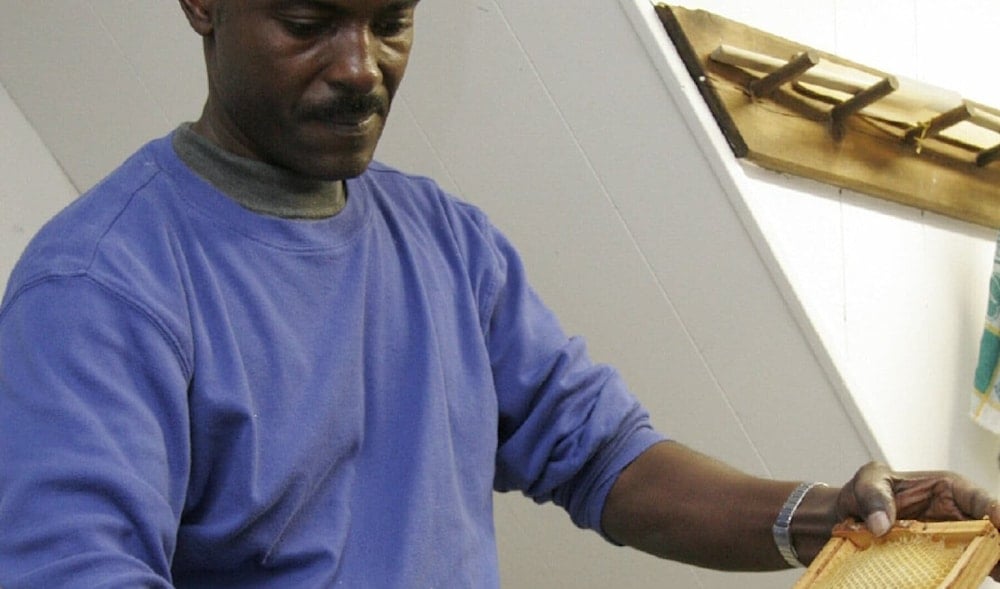New York beekeeper accused of hiding Rwanda genocide role
A Long Island beekeeper faces US fraud charges for allegedly hiding his role in the 1994 Rwandan genocide, where 800,000 Tutsis were killed.
-

Faustin Nsabumukunzi scrapes honey from a honey super, undated (Social media)
A New York beekeeper who has lived in the US for decades is facing allegations of hiding his involvement in the Rwandan genocide, with prosecutors claiming he concealed a leadership role during the atrocities, according to court documents.
When arrested on Thursday for allegedly concealing his past in his green card and citizenship applications, the man told federal agents, "I know I'm finished," according to prosecutors.
Faustin Nsabumukunzi, a 65-year-old Bridgehampton resident, faces charges for allegedly concealing his role as a local Rwandan leader when the 1994 genocide began, during which approximately 800,000 Tutsis were killed. His indictment, unsealed in Central Islip on Long Island, accuses him of hiding this past from US immigration authorities.
During an initial court appearance, Nsabumukunzi entered a not guilty plea to charges of visa fraud and attempted naturalization fraud, securing his release on $250,000 bail under conditions that include home detention, GPS monitoring, and permission to continue working as a gardener.
In an email, Evan Sugar, Nsabumukunzi's lawyer, described his client to The Guardian as "a law-abiding beekeeper and gardener who has resided on Long Island for over 20 years," while also asserting that Nsabumukunzi was "a victim of the Rwandan genocide who lost numerous family members and friends to the violence."
Sugar stated that Nsabumukunzi had legitimately obtained refugee status and lawful permanent residence, emphasizing their intent to vigorously challenge what he described as "30-year-old allegations" while steadfastly maintaining his client's innocence.
Witness interviews contradict claims
Prosecutors stated in a detention memo that witness interviews with individuals who knew Nsabumukunzi in Rwanda revealed he allegedly gave false assurances of protection to Tutsis during public meetings at the genocide's onset, while privately urging Hutus in closed gatherings to begin killing Tutsis, according to the memo's allegations.
Prosecutors cited witness accounts alleging that Nsabumukunzi participated in the killing of Tutsis, including at his administrative offices, and that he encouraged Hutu men to use rape against Tutsi women as a method of genocide.
According to prosecutors, when authorities explained the charges to Nsabumukunzi during his arrest on Thursday morning, he reportedly responded by stating, "I know I'm finished," revealing his immediate reaction to the allegations against him.
The indictment reveals that Nsabumukunzi was convicted in absentia on genocide charges by a Rwandan court, receiving a life sentence while facing accusations of abusing his leadership role to orchestrate the killings of Tutsis in his community.
The indictment alleges that Nsabumukunzi established roadblocks during the genocide to intercept and murder Tutsis while personally participating in killings.
In a public statement, Matthew Galeotti, head of the Justice Department's criminal division, accused Nsabumukunzi of committing "heinous acts of violence abroad" before allegedly deceiving US immigration authorities to secure a green card and pursue American citizenship.
Nsabumukunzi sought refugee resettlement in the US in 2003, obtained permanent residency in 2007, and subsequently filed citizenship applications in both 2009 and 2015, while allegedly concealing his genocidal involvement by falsely claiming no participation in the atrocities.

 3 Min Read
3 Min Read









